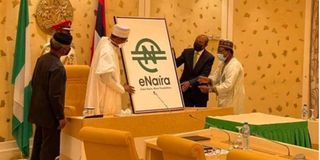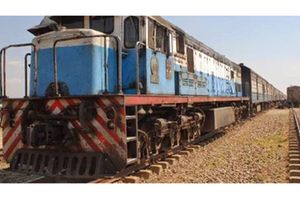Nigeria becomes first African country to roll out digital currency

Nigerian President Muhammadu Buhari launched the country's new digital eNaira currency on Monday as Africa's largest economy looked to tap into the growing popularity of virtual money and cryptocurrencies.
With the eNaira, Nigeria becomes the first in sub-Saharan Africa to fully launch a digital currency and joins China and a few other countries using or piloting central bank-regulated electronic tender.
The digital currency aims to foster economic growth through better economic activities, increase remittances, improve financial inclusion and make monetary policy more effective.
At the launch on Monday in Abuja, President Buhari said the adoption of the Central Bank of Nigeria Digital Currency (CBDC) can increase the nation’s Gross Domestic Product (GDP) by $29 billion over the next 10 years.
The digital currency, he said, has its underlying technology, called blockchain, that would enable the government to send direct payments to citizens eligible for specific welfare programmes as well as foster cross border trade.
''Let me note that aside from the global trend to create Digital Currencies, we believe that there are Nigeria-specific benefits that cut across different sectors of, and concerns of the economy.
''The use of CBDCs can help move many more people and businesses from the informal into the formal sector, thereby increasing the tax base of the country,'' he said.
The President, who assured Nigerians of the safety and scalability of the CBDC system, said the journey to create a digital currency for Nigeria began sometime in 2017.
''Work intensified over the past several months with several brainstorming exercises, deployment of technical partners and advisers, collaboration with the Ministries of Communication and Digital Economy and its sister agencies like the Nigerian Communications Commission (NCC), integration of banking software across the country and painstaking tests to ensure the robustness, safety and scalability of the CBDC System, '' he said.

The President also used the occasion of the unveiling of the eNaira to painstakingly explain to Nigerians why he approved the use of the digital currency.
He noted that Nigeria’s apex bank has invested heavily in creating a Payment System that is ranked in the top ten in the world and certainly the best in Africa.
''This payment system now provides high‐value and time‐critical payment services to financial institutions, and ultimately serves as the backbone for every electronic payment in Nigeria.
''They have also supported several private‐sector initiatives to improve the existing payments landscape, and in turn, have created some of the world’s leading payment service providers today,’’ he said.
In his remarks, the CBN Governor, Mr Godwin Emefiele, explained that eNaira is Nigeria’s CBDC and it is the digital equivalent of the physical Naira.
"The eNaira is the same Naira with far more possibilities. The eNaira – like the physical Naira – is a legal tender in Nigeria and a liability of the CBN. The eNaira and Naira will have the same value and will always be exchanged at 1 naira to 1 eNaira,'' he said.
Emefiele said the CBN has given careful consideration to the entire payments and financial architecture and has designed the eNaira to complement and strengthen these ecosystems and has implemented secure safeguards and policies to maintain the integrity of the financial system.
He pledged that there would be strict adherence to the anti-money laundering and combating the financing of terrorism (AML/CFT) standards in order to preserve the integrity and stability of Nigeria’s payment system.
For the take-off of the eNaira, he reportd that 500 million Naira has been successfully minted by the Bank, N200 million has been issued to financial institutions, over 2,000 customers have been onboarded and over 120 merchants have successfully registered on the eNaira platform.
He also dispelled fears on the nation's $40 billion foreign reserves, saying the reserves are strong and getting stronger by the day.
''As custodians of your national reserves, let me first assure you that there is no cause for alarm. Our Foreign reserves are strong and indeed getting stronger by the day, crossing the 40 billion USD mark, and is one of the highest in Africa - and growing.
''But we cannot fritter our reserves away on cheap imports and currency speculators. We must return to an employment-led growth anchored on productivity and rewarding producers of local goods, services, innovation and new technologies.
'If you consume cheap imports and export our jobs, we will make you pay dearly; but if you produce locally - with little or no foreign inputs beyond machinery, we will support you, and the markets will reward you abundantly,'' he said.





